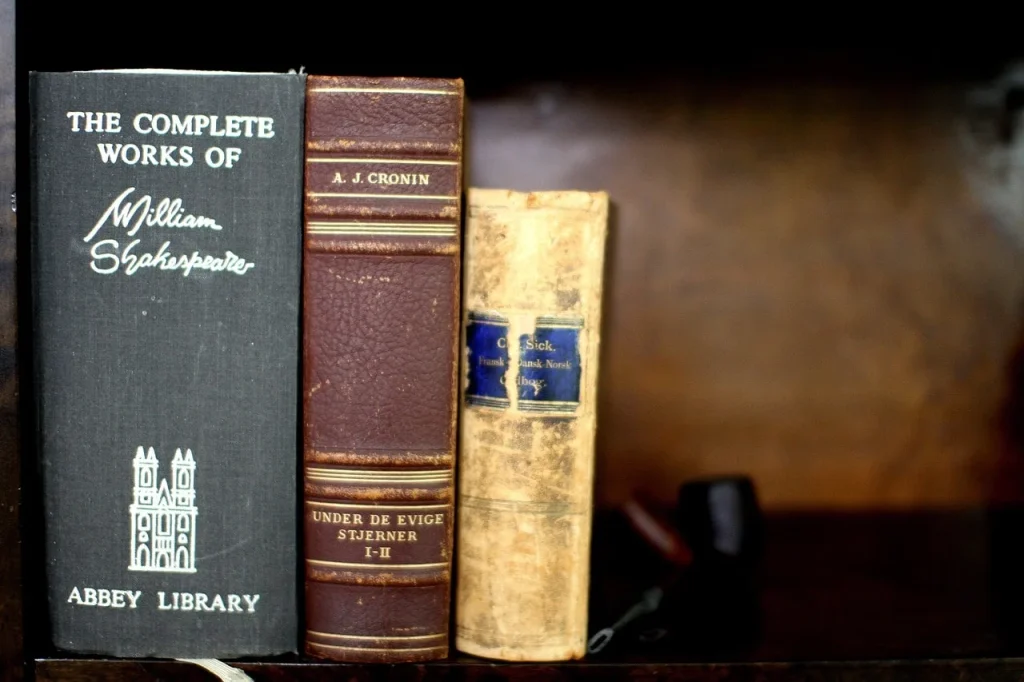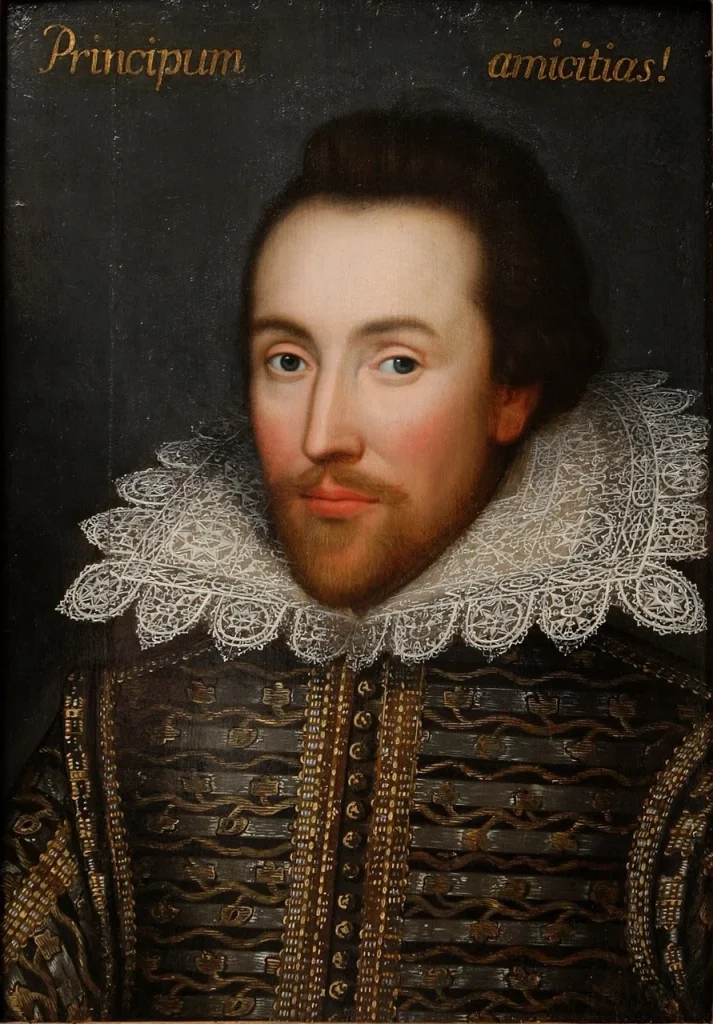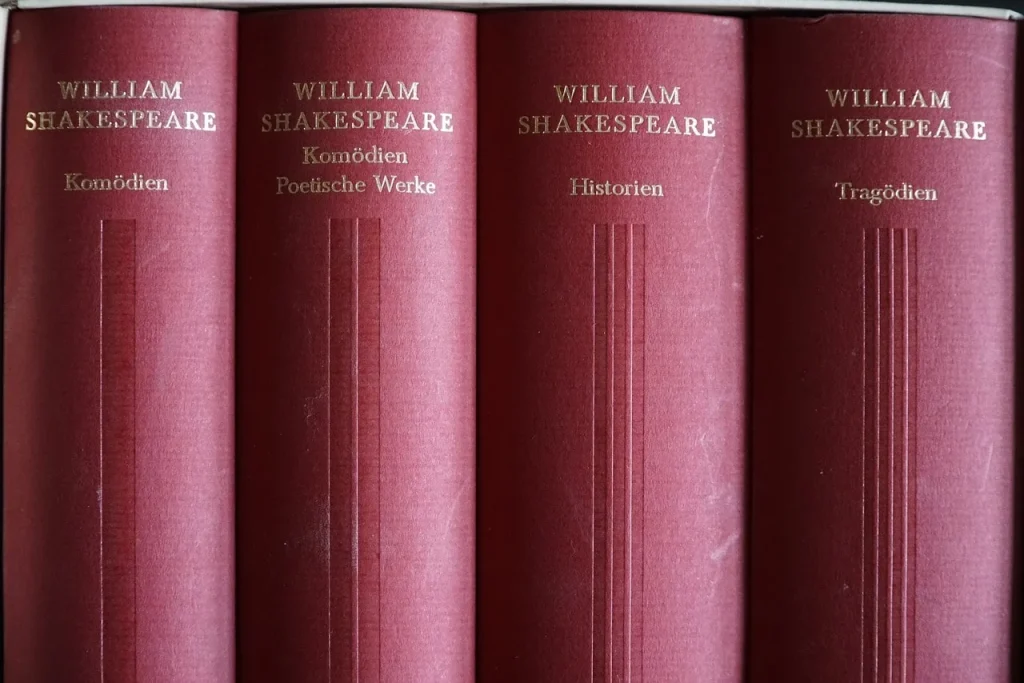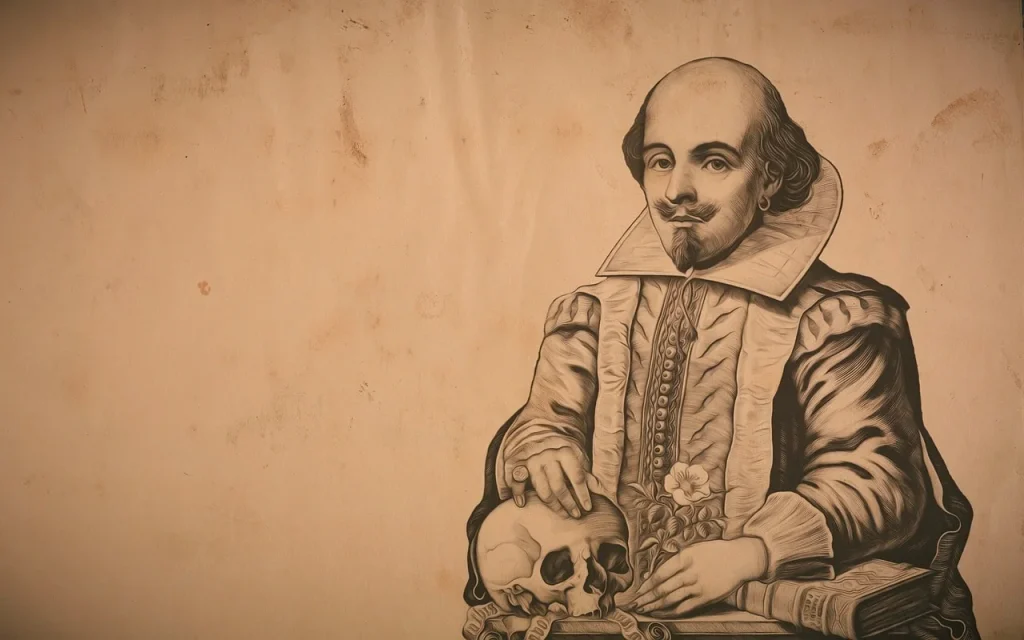Who was William Shakespeare, and why do we continue to study his words centuries after his death?
Today, I want to take you on a journey through the life of one of history’s most influential writers. We’ll discover some interesting facts about Shakespeare, ranging from his personal life to the incredible impact he had on the English language.
Did you know that Shakespeare invented over 1,700 words that we use today? Let’s dive into his world and learn more about his lasting legacy.
He was not of an age, but for all time!
Ben Jonson
Shakespeare Facts
Before we start our journey into the fascinating world of Shakespeare, remember that there’s a quiz at the end of this article. Read carefully to prove your expertise on the Bard of Avon!
- The Bard invented over 1,700 words, including eyeball, birthplace, and gloomy.
- His will famously bequeathed his “second-best bed” to his wife, Anne Hathaway, which scholars still debate over.
- The original pronunciation of his plays sounds substantially different from the modern British and American English renditions.
- He likely acted in his own plays, possibly playing the ghost in Hamlet.
- No manuscripts in his handwriting have survived, leading some to question the authorship of his works.
- The phrase “in a pickle” was first recorded in his play The Tempest.
- There are no direct descendants of Shakespeare alive today; his line ended with the death of his granddaughter.
- The Flower Portrait of the Bard, once thought genuine, was deemed a 19th-century forgery.
- He was not always famous in his lifetime and achieved much of his iconic status posthumously.
- Shakespeare and Miguel de Cervantes, the Spanish author, died almost simultaneously in 1616.
- The earliest known production in the Americas of one of his plays was Romeo and Juliet, in 1730 in New York.
- During the English Civil War, performances of his plays were officially banned by the Puritan government.
- The Globe Theatre burned down in 1613 during a performance of Henry VIII when a cannon shot set the thatched roof ablaze.

- He possibly died on his birthday, April 23, which is also St. George’s Day, the patron saint of England.
- Neil Armstrong took a piece of a mulberry tree, said to have been planted by Shakespeare, to the moon.
- The longest word in his works is “Honorificabilitudinitatibus” from Love’s Labour’s Lost.
- Queen Elizabeth I was known to be an enthusiastic fan of his performances.
- His influence extends into the legal world; many legal arguments are phrased in Shakespearean language and allusions.
- The Folio editions of his work, published posthumously, likely saved many of his plays, which might otherwise have been lost.
- Some conspiracy theories suggest Shakespeare was a pseudonym for an aristocratic writer who needed to remain anonymous.
- He is often credited with creating the humanist approach to characters, emphasizing their depth and complexity.
- The name “Jessica,” from The Merchant of Venice, was likely coined by him and became a popular English name.
- His family’s coat of arms included the motto “Non sanz droict,” or “Not without right.”
- He had a substantial influence on the English language, comparable to the King James Bible.
- The only known eulogy written for him at the time of his death was by his friend Ben Jonson, who famously called him “Star of Poets.”
- His play Macbeth is believed to be cursed; superstitious actors refer to it only as “The Scottish Play.”
- A Shakespeare manuscript, if found today, would likely be the most valuable literary find in history.
- “All the world’s a stage,” a famous line from As You Like It, brilliantly summarizes his perception of life and drama.

- Shakespeare’s mother, Mary Arden, came from an affluent family, possibly giving him a wealthier upbringing than previously thought.
- The phrase “wild-goose chase” originates from Romeo and Juliet.
- He was part of the Lord Chamberlain’s Men, an acting company that became one of the leading companies in London.
- Shakespeare was likely educated at the King’s New School in Stratford, which emphasized a classical education.
- Speculations about his private life abound, due to the scant records that exist, giving rise to numerous biographical mysteries.
- Several of his plays, including The Comedy of Errors, are adaptations of earlier works, which he enriched with his complex storytelling.
- John Heminges and Henry Condell, two of Shakespeare’s fellow actors, compiled the First Folio of his works.
- He was deeply interested in themes of power and legitimacy, often questioning royal authority in his plays.
- The Bodleian Library at Oxford University initially sold its copy of the First Folio to make room for newer editions, only to buy it back later at a higher price due to its historical value.
- Despite his fame, the exact order and dates of his plays’ writings are not precisely known, leading to debates and theories among scholars.

- His vocabulary range was between 17,000 to 29,000 words, a reflection of his profound linguistic ability.
- His influence reached far beyond literature; psychoanalytic theory frequently references his characters’ psychological depth.
- Shakespeare’s work is mandatory in many educational systems globally, ensuring that his legacy endures in literature classes.
- The First Folio is one of the most sought-after books by collectors, with some copies valued in the millions of dollars.
- His portrayal of historical events and figures is often taken as actual history, despite many inaccuracies for dramatic effect.
- Shakespeare’s influence on the English language is so profound that many everyday phrases come from his writing without people realizing it.
- The Victorians adored his work, leading to a resurgence in his popularity during the 19th century with numerous revivals and adaptations.
- The Swan Theatre, built in 1595, was contemporary with the Globe and staged many of his plays.
- He often collaborated with other playwrights, a common practice at the time, which complicates authorship attribution for several of his works.
- The word “bump” was first recorded in his play Romeo and Juliet.
- Venus and Adonis was his first published work and became one of the best-selling poems of his time.
- The cobbe portrait, believed to be of Shakespeare, is the only known portrait painted from life, adding immense value to Shakespearean scholarship.
Shakespeare Myths

With the facts about Shakespeare laid out, it’s time to address the myths. Let’s clear up what’s true and what’s not.
- Shakespeare Wrote All His Plays Alone
It is widely believed that he worked collaboratively on some of his plays. Researchers suggest that up to 17 of the plays were produced in partnership with other playwrights, which was a common practice at the time. - Shakespeare’s Works Were Written in Old English
In fact, Shakespeare’s plays and poems were written in early modern English. This form of English is closer to the language we use today than Old English, which predates the Norman invasion of 1066. - “To Be, Or Not To Be” is from ‘Romeo and Juliet’
This famous soliloquy is often misattributed to ‘Romeo and Juliet‘. However, it is actually found in ‘Hamlet’. The confusion might be due to the themes of love and death present in both plays. - Shakespeare Had a Vast Education
While it is often assumed that he was extensively educated, his formal education was actually quite typical for the time. He attended a grammar school in Stratford-upon-Avon, where a strong emphasis was placed on Latin texts and grammar. - The Originality of Shakespeare’s Plots
Many of Shakespeare’s plots are not original to him. They were borrowed from historical sources, other literary works, or folklore. His genius is recognized in the unique expansion and emotional depth he imparted to these familiar stories.
No products found.
Shakespeare Quotes

We continue with some of my favorite quotes. Feel free to share yours in the comments so I can add them to the list as well.
Shakespeare is the happy hunting ground of all minds that have lost their balance.
James Joyce
The renowned writer James Joyce noted this, suggesting that Shakespeare’s complex and rich literary works are particularly appealing to those with a deep, perhaps obsessive, passion for layered narratives and psychological intricacies.
Others abide our question. Thou art free.
Matthew Arnold
Poet Matthew Arnold praised Shakespeare in his poem “Shakespeare,” emphasizing his enduring genius and the timeless mystery surrounding his persona, which seems to transcend ordinary scrutiny.
Shakespeare’s magic could not copied be; Within that circle none durst walk but he.
John Dryden
John Dryden, a prominent poet and critic, acknowledged Shakespeare’s unique and unrivaled talent in his poem “To the Memory of Mr. Oldham,” underscoring the singular nature of Shakespeare’s dramatic genius.
Shakespeare was the greatest psychologist who ever lived.
Howard Bloom
Literary critic Howard Bloom offered this assessment, placing Shakespeare above all others in his ability to probe and depict the human psyche through his characters and stories.
What a piece of work is a man, how noble in reason, how infinite in faculties, in form and moving how express and admirable, in action how like an angel, in apprehension how like a god—the beauty of the world, the paragon of animals!
Sigmund Freud
Freud, the father of psychoanalysis, frequently quoted Shakespeare’s Hamlet to illustrate his theories of the human mind, admiring Shakespeare’s insight into human nature and emotion. This quote encapsulates the complex view of humanity that both Shakespeare and Freud explored in their works.
Shakespeare FAQ

As we draw closer to the quiz, the following FAQ section will help consolidate your understanding of Shakespeare’s timeless words. Read carefully to ensure you’re fully prepared.
- Was “Romeo and Juliet” a true story?
No, “Romeo and Juliet” is not a true story. It is a work of fiction created by Shakespeare, likely inspired by earlier tales and poems about star-crossed lovers. - How did William Shakespeare die?
He passed away on April 23, 1616, in his hometown of Stratford-upon-Avon. The exact cause of his death is unknown, as historical records do not specify details. - How many words did Shakespeare invent?
He is credited with inventing or popularizing around 1,700 words in the English language, including words like “bedazzled,” “fashionable,” and “lonely.” - What was Shakespeare’s first play?
It is believed that Shakespeare’s first play was “Henry VI, Part I,” written around 1589-1590, which is part of a historical trilogy. - Was Shakespeare ever married, and did he have children?
Yes, he was married to Anne Hathaway in 1582. They had three children together: Susanna and twins Hamnet and Judith.
No products found.
Shakespeare Trivia

Welcome to our Shakespeare quiz! If you don’t get at least one question right, beware: you might be haunted by the ghost of Hamlet’s father for all eternity!
Conclusion
Reflecting on his legacy, we see a writer who could capture the essence of human emotion and societal issues in just a few well-chosen words. His plays show us that the themes of love, power, jealousy, and betrayal are timeless.
As you continue to explore Shakespeare, you’ll discover layers of meaning and relevance, no matter your background. He is not just for scholars but for anyone who appreciates the beauty of language and the complexities of life. Till next time, stay curious and explore more. Cheers.
1 Source Used For This Article

